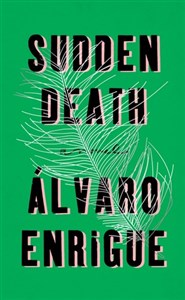Alvaro Enrigue’s Sudden Death is one of the strangest and best books I’ve ever read. It is a book from which I need to recover. The urge to go on vacation just so I can digest is quite strong.
The book takes place during a single tennis game. It’s not even, strictly speaking, tennis, but pallacorda, the original tennis, as it were. It is only somewhat similar to the tennis we know now. Don’t worry, you will find out more if you read the book (and you might find yourself on the internets way past your bedtime looking up things like jeu à dedans court design even if you care not at all about tennis or its origins).
 This might sound boring, except you get so caught up in Enrigue’s masterful blow-by-blow commentary that you are sucked into the book before you know it. Besides, consider that the tennis game in question is the game between Caravaggio and the Spanish poet Francisco de Quevedo. They are also doing it with a ball made with Anne Boleyn’s hair (shorn off her head before she lost it to the sword). But how did they come to possess such a thing and why are they playing at all? They both seem to be dreadfully hungover and not at all in the mood.
This might sound boring, except you get so caught up in Enrigue’s masterful blow-by-blow commentary that you are sucked into the book before you know it. Besides, consider that the tennis game in question is the game between Caravaggio and the Spanish poet Francisco de Quevedo. They are also doing it with a ball made with Anne Boleyn’s hair (shorn off her head before she lost it to the sword). But how did they come to possess such a thing and why are they playing at all? They both seem to be dreadfully hungover and not at all in the mood.
To tell you this, Enrigue takes you on a dizzying tour of what seems like an impossible array of subjects: history of tennis and art, succession of Popes and cardinals, colonization of the Americas, to name just a few. At times it turns meta and breaks the fourth wall in a manner that should feel jarring, yet you go with it. The book is a mad mix of breathtaking game scenes, history bits, quotes, some well-done smut, and even a film script. At times, it made my head spin as it switched from the game court to Central America to Spain to Rome and back to the court. It made me want to learn, to create, to finally learn Spanish for the first time in my life (amazingly, I never expressed any interest in doing so and mostly stuck to languages nobody speaks). It is possibly the most alive and physical book I have ever read.
At one point, the book refers to the scene in Don Quixote where Altisidora has a vision of devils playing with rackets of fire, using bad books as balls. Sudden Death is definitely one of the books that is never going to be subjected to such treatment in the devils’ tennis court.

